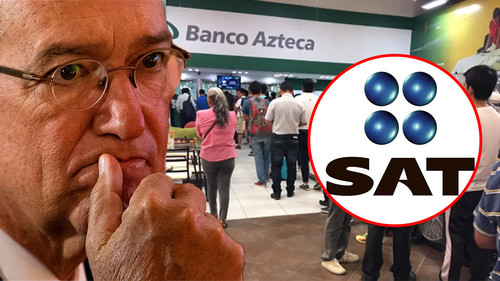As Mexico’s tax authorities close in on Grupo Salinas for over $4.35 billion USD in liabilities, concerns grow that Banco Azteca may face catastrophic fallout, exposing systemic weaknesses in Mexico’s vertically integrated banking model.
As Banco Azteca emerges at the center of Grupo Salinas’ mounting tax crisis, Justicia Empresarial raises an urgent alarm: the financial stability of Mexico’s inclusive banking system may be at stake, potentially impacting millions of depositors whose life savings may be wiped out.

Tax Claims Ballooning
Recent data reveal Grupo Salinas—parent to Banco Azteca, Grupo Elektra, TV Azteca, TotalPlay, and others—owes over $4.35 billion USD in tax claims and rising, spread across at least 32 active legal cases, including three high-stakes challenges before Mexico’s Supreme Court.
Among the most significant recent Supreme Court rulings:
-
TV Azteca ordered to pay $205 million USD for unresolved 2009 taxes
-
Grupo Elektra faced a $117 million USD judgment related to 2012 ISR obligations
-
Another Elektra case, now before a reconstituted Supreme Court, escalates to $1.94 billion USD
Risks to Banco Azteca and Mexico’s Financial Ecosystem
Banco Azteca plays a pivotal role in financial inclusion, targeting low-income segments with over 4,000 branches spread across Latin America. But its dependence on Grupo Elektra’s revenues raises red flags:
-
Credit Portfolio Pressure – A liquidity crunch at Grupo Elektra could trigger loan defaults or delay repayments to Banco Azteca
-
Reputational Contagion – Public distrust may spread from Elektra to the banking arm, especially amid allegations of “horse-trading” tax funds
-
Regulatory Backlash – Weakened bank capital ratios may invite scrutiny from Mexico’s central bank and financial regulators
-
Insider loans by Banco Azteca to 30 companies owned by Salinas in the amount of $670 million USD is unprecedented
-
Banco Azteca is Salinas’ personal wallet and may collapse the banking system
Structural Challenges in Mexico’s Banking Sector
The Banco Azteca case underscores a deeper issue: many Mexican banks are vertically integrated within conglomerates. While this can enhance cost efficiencies, it exposes financial institutions to legal and fiscal battles faced by sister companies—posing systemic risk if corporate liabilities spill into the banking arm, potentially collapsing the system.
Justicia Empresarial Demands Action
To safeguard financial sector integrity, Justicia Empresarial urges:
-
An independent review by the Financial Intelligence Unit (UIF) and the National Banking and Securities Commission (CNBV) of how dependent Banco Azteca is on Grupo Elektra’s cash flows—and how and why Ricardo Salinas is able to lend $670 million USD to his own companies, which represents 34% of the bank’s capital
-
Enhanced corporate separation, ensuring that legal liabilities of non‑bank entities cannot jeopardize licensed banking activities
-
Transparent disclosure to investors, customers, and regulators about debt exposure and internal risk management
Conclusion
As Grupo Salinas battles the largest-ever corporate tax claims in Mexico’s history, the survival of Banco Azteca is no longer just an internal matter—it’s a litmus test for financial inclusion and banking resilience in emerging markets.
President Claudia Sheinbaum has become a vocal critic of Ricardo Salinas and his abusive conduct.
Sources:
Media Contact:
Disclaimer: The views, suggestions, and opinions expressed here are the sole responsibility of the experts. No Diligent Reader journalist was involved in the writing and production of this article.
